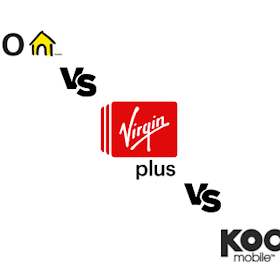Year after year, we hear the same question: why are cell phone plans so expensive in Canada? We understand the frustration. According to Rewheel, an independent telecom research firm, Canada is home to some of the most expensive cell phone plans in the world, with the median price over 30% higher than the U.S. equivalent.
The reasons for Canada’s expensive plans are complicated: limited infrastructure, minimal competition, and muted government regulation are just some of the contributing factors. In this guide, we’ll explain how these contribute to our high prices and offer some recommendations for navigating the market, including some strategies for finding the best cell phone plans for your wallet.
Canada vs. U.S.: Phone plan price comparison
It’s tempting to look to the United States when evaluating Canada’s cell phone plans. Although they’re different markets—with different carriers, regulations, and currencies—it’s a natural comparison. Rewheel’s 2022 report ranked Canada’s median price as the second most expensive among the 50 countries they studied; the United States placed seventh.

Comparing plans between countries is far from a perfect science, though, even after factoring in the exchange rate. The United States has a very different telecom market, with more competition (through smaller carriers called MVNOs) and different options for consumers, like a different kind of unlimited plan, which offers truly unlimited data, unlike the deceptively named Canadian equivalent.
Still, as the Rewheel report demonstrates, Canada has exceptionally high prices for mobility plans. So, why is that?
Why are Canadian cell phone plans expensive?
Canadian cell phone plans are expensive for a number of complex reasons, but there are three major contributing factors for their exceptionally high monthly payments:
- Limited infrastructure
- Minimal competition
- Muted government regulation
Let’s walk through the basics so you can get a better understanding of how these factors contribute to Canada’s expensive cell phone plans.
Limited infrastructure
Geographically speaking, Canada is an enormous country. Its 9.985 million kilometers of land make it the second largest country in the world. As you can probably imagine, building the hardware necessary for wireless coverage across such a vast swath of earth is a difficult task. We can see that bare out in the country’s limited infrastructure: while Canada’s urban areas are well covered, with 99.9% coverage from the Big Three in the country’s eight largest cities, its northern wilderness is still relatively untouched. Telus, who operates the largest wireless network in Canada, only covers 37% of the country.

Major Canadian carriers suggest expanding coverage throughout the country is expensive, with the cost trickling down to customers’ monthly payments. The CRTC recently mandated the Big Three share their networks with regional carriers, which many hope will start to fix the problem.
Muted government regulation
Canadians often argue mobility prices would be lower if there were more competition. It’s a fair point: in theory, more competition incentivizes carriers to lower prices and increase data to attract subscribers. In Canada, we can see that theory playing out in select provinces with strong regional carriers, like Saskatchewan (SaskTel), Ontario (Freedom Mobile), Quebec (Videotron and Freedom Mobile). For example, Telus’ Essential 6 5G Plan is available in Quebec for just $45/month, though the carrier doesn’t offer that plan in any other provinces. By and large, plans from the Big Three are markedly lower in these regions because they’re forced to compete with the regional carriers’ lower prices.
For many, the way to attract more competition is to welcome more MVNOs, carriers who purchase access to large mobile networks and resell it to consumers at discounted rates. MVNOs exist in Canada, though the title is often used incorrectly. Virgin Plus, Fido, and Koodo are often propped up as examples of affordable MVNOs, though they’re respectively owned by Bell, Rogers, and Telus.Minimal competition
The CRTC has vowed to lower plans, but its success has been debated. A 2022 report funded by the Canadian Government suggested plans in Canada are, on average, cheaper than comparable U.S. plans. The report, however, did not include American MVNOs, which offer lower rates than the country’s own Big Three of AT&T, Verizon, and T-Mobile.
In 2022, the CRTC touted legislation that would, in theory, encourage more MVNOs to offer cheaper plans to Canadians. The decision, however, was limited to carriers already operating in Canada, frustrating those hoping for legislation that would lead to immediate market competition.
The recent Rogers-Shaw merger did little to quell Canadians’ cynicism about the wireless industry. Ben Klass, a telecom policy researcher at Carleton University, summed up many Canadians’ feelings in an interview with CBC News: “This is a merger that is going to help the billionaire families that own these companies, not average Canadians who have to pay mobile bills at the end of the month.”
Cell phone plan prices in Canada
Cell phone plan prices in Canada cost between $10/month and $110/month, with the best options for typical internet users in the $40 to $60 range. (If you're curious about snagging a U.S. plan you can grab one from AT&T, though they come with their own risks.)
We especially like Fido’s $55 Data, Talk & Text Plan, which offers 30GB of 4G LTE data and unlimited talk and text, and SimplyConnect’s $40 Smartphone Plan, which offers 6GB of 4G LTE data and unlimited talk and text. Both plans are among the best cell phone plans in Canada.
Interested in seeing more options? You can find the most popular cell phone plans in Canada below.
What you'll get for your money
The average Canadian uses about 6GB of mobile data per month, an amount that Americans can grab for around $30/month. In Canada, that will only be enough for a plan that will only allow for unlimited talk and text, but only enough data for basic web browsing. For example, here's a comparison between two $30 plans: SimplyConnect's $30 Smartphone Plan and AT&T's Prepaid $30 Monthly Plan.

- Unlimited talk and text
- 1GB of 4G LTE data

- Unlimited talk and text
- 5GB of full-speed 4G LTE data
Now let's move to $40. Fido's $39 Data, Talk & Text Plan with 10GB and Boost Mobile's $40 Plan. $40 will get you a little more in Canada, pushing you above the 6GB data average and securing unlimited talk and text. Still, the data will likely be 4G LTE rather than 5G. In the U.S., it’ll take you even further, with around least three times the data–at 5G speeds–plus additional data for mobile hotspots.

- Unlimited talk and text
- 10GB of 4G LTE data
- 5 free hours of data per month

- Unlimited talk and text
- 35GB of 5G data
- 12GB mobile hotspot
Flanker brands like Virgin Plus, Fido, and Koodo offer solid data allotments for $50, but they pale in comparison to their U.S. counterparts. Look no further than the differences between Koodo's $50 No Tab/BYO Plan with 40GB Data and Straight Talk Wireless' $50 Gold Unlimited Data Plan. $50 in the U.S. is enough for unlimited data and a sizeable chunk of data for mobile hotspots, a plan that would cost closer to $100 in Canada.

- Unlimited talk and text
- 40GB of 4G LTE data
- No data overages

- Unlimited talk and text
- Unlimited 5G data
- 15GB mobile hotspot
Scouring all of the offerings from Canadian carriers reveal some patterns, the most obvious being the Big Three’s symmetry. Take a look at Bell’s Essential 75GB Plan, Rogers’ Infinite Essential Plan, and Telus’ Unlimited 75 5G, which all offer 75GB of 5G data for $85/month. It’s enough to make Canadians cry “oligopoly.”
Watch our "Best US Cell Phone Plans Available in Canada" video
Subscribe to our YouTube channel for more videos like this one! Learn about switching providers, scoring the best unlimited data deals, and more.
Cheapest Canadian cell phone plans
Although cell phone plans in Canada are more expensive than comparable plans in other countries, we’re still home to plenty of cheap options—as long as you know where to look.
We’re especially fond of Fido’s Basic Plan, which offers unlimited texting, 100 Canada-wide minutes, and 250MB of 3G data on the Rogers network for just $15/month. If you’re looking for something with a little more of everything, we recommend Lucky Mobile’s $25 Unlimited Canada-wide Calling Plan, which gives you unlimited talk and text plus 1GB of full-speed 4G data on the nationwide Bell network for just $25/month.
Want more options to choose from? Check out our list of the best cheap phone plans or browse the cheapest cell phone plans in Canada below.How to save money on your phone bill
Finding an affordable cell phone plan in Canada is difficult, but it’s not impossible. The best way to save money on your phone bill is by exploring your options with MVNOs, family plans, and prepaid options.
MVNOs
Canadian MVNOs operate on the large, nationwide networks of the Big Three but offer more affordable prices aimed at budget-minded consumers. Flankers like Virgin Plus, Rogers, and Koodo might not offer 5G plans, but their generous 4G LTE data chunks and low monthly prices make for some of the best cell phone plans in Canada.
Family plans
Paying for individual plans for the same household doesn’t make financial sense. Most Canadian carriers–including Bell, Koodo, and Freedom Mobile–offer family plans, which offer shared data chunks and steep discounts on your monthly bill.
Prepaid options
Prepaid carriers offer modest plans without the frills of their premium counterparts, with prices starting as low as $15/month. Brands like Lucky, Chatr, and Public offer some of the best prepaid cell phone plans in Canada without any of the trappings of term contracts. That leaves you free to switch to a cheaper carrier when they offer deals and limited-time rates.
Why are cell phone plans so expensive in Canada?: FAQs
Related Articles
Find Better Phones and Plans
Hundreds of cell phone plans unpacked. All the facts. No surprises.










































